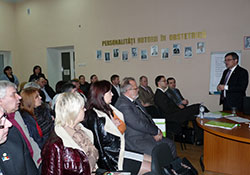Institutional strengthening of health insurance company in Republic of Moldova paves way for improved health system performance

WHO
In 2012, the Moldovan Government adopted an Institutional Development Strategy for the country’s National Health Insurance Company (NHIC). This year emphasis will be placed on bringing about institutional change to enable implementation of the Strategy. This process began with a series of consultative meetings and workshops organized in Chisinau from 22 to 25 January 2013 by the NHIC with WHO support.
The main objective of the consultations was to assess critically the organizational performance, distribution of responsibilities and work arrangement, resource distribution and structural layout of the institution, in order to make it more efficient and responsive to strategic needs. The introduction of organizational changes aims at creating an environment to support and monitor the first year of strategy execution and will pave the way for achieving future goals and ambitions.
Key stage in strengthening health system financing and performance
The consultative process involved representatives of the central office and territorial branches of the NHIC, the central Government, Ministry of Health, civil society, international organizations and independent local and external experts.
Dr Mircea Buga, Director General of NHIC, welcomed participants and stated in his opening speech: “Last year we initiated an important process for our company – the development of the Institutional Strategy and Action Plan. I am really encouraged that both documents have been subsequently approved, but we have to move now to the next stage, namely the implementation of the strategic documents.” Dr Buga expressed gratitude to WHO for continuous support in health financing at country level, including work on the NHIC’s strategy development.
“The Strategy and Action Plan are important for NHIC to improve its internal performance but also for the entire health system: their implementation can significantly influence service provision to be more patient needs based and apply incentives to increase efficiency and equity,” said Dr Jarno Habicht, WHO Representative. “WHO is ready to provide additional support in the process to strengthen the key health financing institution, but at the same time I am sure that the health insurance fund’s team and staff will play the crucial role in making the change happen.”
WHO support
WHO contributed to the event by bringing external expertise to the country level and by providing direct financial and logistical support. Assistance in implementation of the NHIC Strategy is part of the biennial collaborative agreement (BCA) 2012–2013 between the Ministry of Health of the Republic of Moldova and WHO/Europe.
The current consultations are also part of the European-Commission-funded technical assistance programme under WHO coordination. The objectives of the programme include strengthening stewardship of health sector investments, better performance monitoring and ensuring greater use of evidence for policy decisions.



